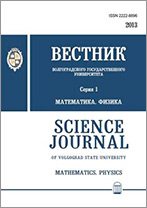|
This article is cited in 2 scientific papers (total in 2 papers)
Mathematics
Existence of solutions of anisotropic elliptic equations with variable exponents of nonlinearity in unbounded domains
L. M. Kozhevnikova, A. Sh. Kamalåtdinov
Sterlitamak Branch of Bashkir State University
Abstract:
For anisotropic quasilinear second order elliptic equations in divergence form with a non-standard growth conditions
\begin{equation}
\sum\limits_{i=1}^{n}(a_i(\mathrm{x},u,\nabla u))_{x_i}-a_0(\mathrm{x},u,\nabla u)=0,\quad \mathrm{x} \in \Omega; \tag{1}
\end{equation}
in domain $\Omega $ of the space
$\mathbb{R}^n,\;\Omega\subsetneq \mathbb{R}^n,\; n \geq 2,$ the Dirichlet problem is considered with homogeneous boundary condition
\begin{equation}
u\Big|_{\partial\Omega}= 0. \tag{2}
\end{equation}
It is assumed that the functions $a_i(\mathrm{x},s_0,s_1,\ldots,s_n)$
have an polinomial growth on variable $s_i$ with powers
$p_i(\mathrm{x})\in(1,\infty),\;i=0,1,\ldots,n$. As example can be used
the equation
$$
\sum\limits_{i=1}^{n}(|u_{x_i}|^{p_i(\mathrm{x})-2}u_{x_i})_{x_i}-|u|^{p_0(\mathrm{x})-2}u=\sum\limits_{i=1}^{n}(\phi_i(\mathrm{x}))_{x_i}-\phi_0(\mathrm{x}).
$$
In the paper by M. B. Benboubker, E. Azroul, A. Barbara (Quasilinear
elliptic problems with nonstandartd growths, Electronic Journal of
Differential Equations, 2011) the existence of solutions of the
Dirichlet problem in a bounded domain was proved for an isotropic
elliptic equations with variable nonlinearities. For isotropic
equations with constant power of nonlinearity the existence of
solutions of the Dirichlet problem in an arbitrary domain was
established by F. E. Browder (Pseudo-monotone operators and
nonlinear elliptic boundary value problems on unbounded domains,
Proc. Nati. Acad. Sci. USA, 1977). The proof is based on an
abstract theorem for pseudomonotone operators. In this paper we
prove the existence of solutions of the problem
(1), (2) without the assumption of
boundedness of $\Omega$ and the smoothness of its boundary.
Note by $L_{p(\cdot)}(\Omega)$ Lebesgue spaces with variable exponent $p(\mathrm{x})$ and the Luxemburg norm $\|\cdot\|_{p(\cdot)}$. Let the $\overrightarrow{\mathbf p} (\mathrm{x})=(p_0(\mathrm{x}),p_1(\mathrm{x}),...,p_n(\mathrm{x})) \in (L^+_{\infty}(\Omega))^{n+1}\cap(C^+ (\overline{\Omega}))^{n+1}$.
The Sobolev–Orlicz space with variable exponents $\mathring
{W}_{\overrightarrow{\mathbf p}(\cdot)}^{1}(\Omega)$ is defined as the
completion of the space $C_0^{\infty}(\Omega)$ in the norm
$$
\|v\|_{\mathring
{W}_{\overrightarrow{\mathbf p}(\cdot)}^{1}(\Omega)}=\|v\|_{p_0(\cdot)}+\sum\limits_{i=1}^n\|v_{x_i}\|_{p_i(\cdot)}.
$$
It is assumed that
\begin{equation}
p_+(\mathrm{x})\leq
p_0(\mathrm{x})< p_*(\mathrm{x}),\quad \mathrm{x}\in \Omega, \tag{3}
\end{equation}
where
$$p_+(\mathrm{x})=\max\{p_1(\mathrm{x}),p_2(\mathrm{x}),...,p_n(\mathrm{x})\}, \quad
p_*(\mathrm{x})=\left\{
\begin{array}{ll}\frac{n\overline{p}(\mathrm{x})}{n-\overline{p}(\mathrm{x})},& \overline{p}(\mathrm{x})>n,\\
+\infty,& \overline{p}(\mathrm{x})\leq n,
\end{array}
\right.,$$
$$ \quad\overline{p}(\mathrm{x})={n}\left(\sum\limits_{i=1}^n 1/p_i(\mathrm{x})\right)^{-1}.$$
And it is also assumed that $a_i(\mathrm{x},s_0,\mathrm{s}), \;$
$i=0,\ldots,n,$ $\mathrm{x}\in \Omega,\;$ $\mathbf{s}=(s_0,
\mathrm{s})=(s_0,s_1,\ldots,s_{n})\in\mathbb{R}^{n+1}$, are the
Caratheodory functions, and there exist positive numbers
$\widehat{a}, \overline{a}$ and measurable non-negative function
$\phi(\mathrm{x})\in L_1(\Omega),$ $\Phi_i(\mathrm{x})\in
L_{p'_i(\cdot)}(\Omega),\;p'_i(\mathrm{x})=p_i(\mathrm{x})/(p_i(\mathrm{x})-1),\;i=0,1,\ldots,n,$ such that for almost all
$\mathrm{x}\in\Omega$ and any ${\mathbf
s}=(s_0,\mathrm{s})\in\mathbb{R}^{n+1}$ the inequalities hold:
\begin{equation}
|a_i(\mathrm{x},s_0,\mathrm{s})|\leq \widehat{a}
(|s_i|^{p_i(\mathrm{x})-1}+|s_0|^{p_0(\mathrm{x})/p'_i(\mathrm{x})})+\Phi_i(\mathrm{x}),\quad
i=0,1,\ldots,n; \tag{4}
\end{equation}
\begin{equation}
\sum\limits_{i=1}^n(a_i(\mathrm{x},s_0,\mathrm{s})-a_i(\mathrm{x},{s}_0,\mathrm{t}))(s_i-t_i)>0,\quad \mathrm{s}\neq \mathrm{t}; \tag{5}
\end{equation}
\begin{equation}
\sum\limits_{i=0}^na_i(\mathrm{x},s_0,\mathrm{s})s_i\geq \overline{a}\sum\limits_{i=0}^n|s_i|^{p_i(\mathrm{x})}-\phi(\mathrm{x}). \tag{6}
\end{equation}
Elliptic operators
${\mathbf A}:\mathring{W}_{\overrightarrow{\mathbf p}(\cdot)}^{1}(\Omega)\rightarrow \left(\mathring{W}_{\overrightarrow{\mathbf p}(\cdot)}^{1}(\Omega)\right)',$ corresponding to the problem (1), (2), defined by the equation:
$$
\langle{\mathbf
A}(u),v\rangle=\int\limits_{\Omega}\sum\limits_{i=0}^{n}a_i(\mathrm{x},u,\nabla
u)v_{x_i}d\mathrm{x},\quad u(\mathrm{x}), v(\mathrm{x}) \in
\mathring{W}^{1}_{\overrightarrow{\mathbf p}(\cdot)} ({\Omega}).$$
It
is proved that operator ${\mathbf A}$ is pseudomonotone, bounded and
coercitive. On the basis of these properties we prove the theorem.
Theorem. If the conditions (3)–(6), there is a generalized solution of the problem (1), (2).
Keywords:
anisotropic elliptic equation, existence solution, variable exponent, Dirichlet problem, pseudomonotone operator.
Citation:
L. M. Kozhevnikova, A. Sh. Kamalåtdinov, “Existence of solutions of anisotropic elliptic equations with variable exponents of nonlinearity in unbounded domains”, Vestnik Volgogradskogo gosudarstvennogo universiteta. Seriya 1. Mathematica. Physica, 2016, no. 5(36), 29–41
Linking options:
https://www.mathnet.ru/eng/vvgum129 https://www.mathnet.ru/eng/vvgum/y2016/i5/p29
|

| Statistics & downloads: |
| Abstract page: | 285 | | Full-text PDF : | 86 | | References: | 65 |
|




 Contact us:
Contact us: Terms of Use
Terms of Use
 Registration to the website
Registration to the website Logotypes
Logotypes








 Citation in format
Citation in format 
